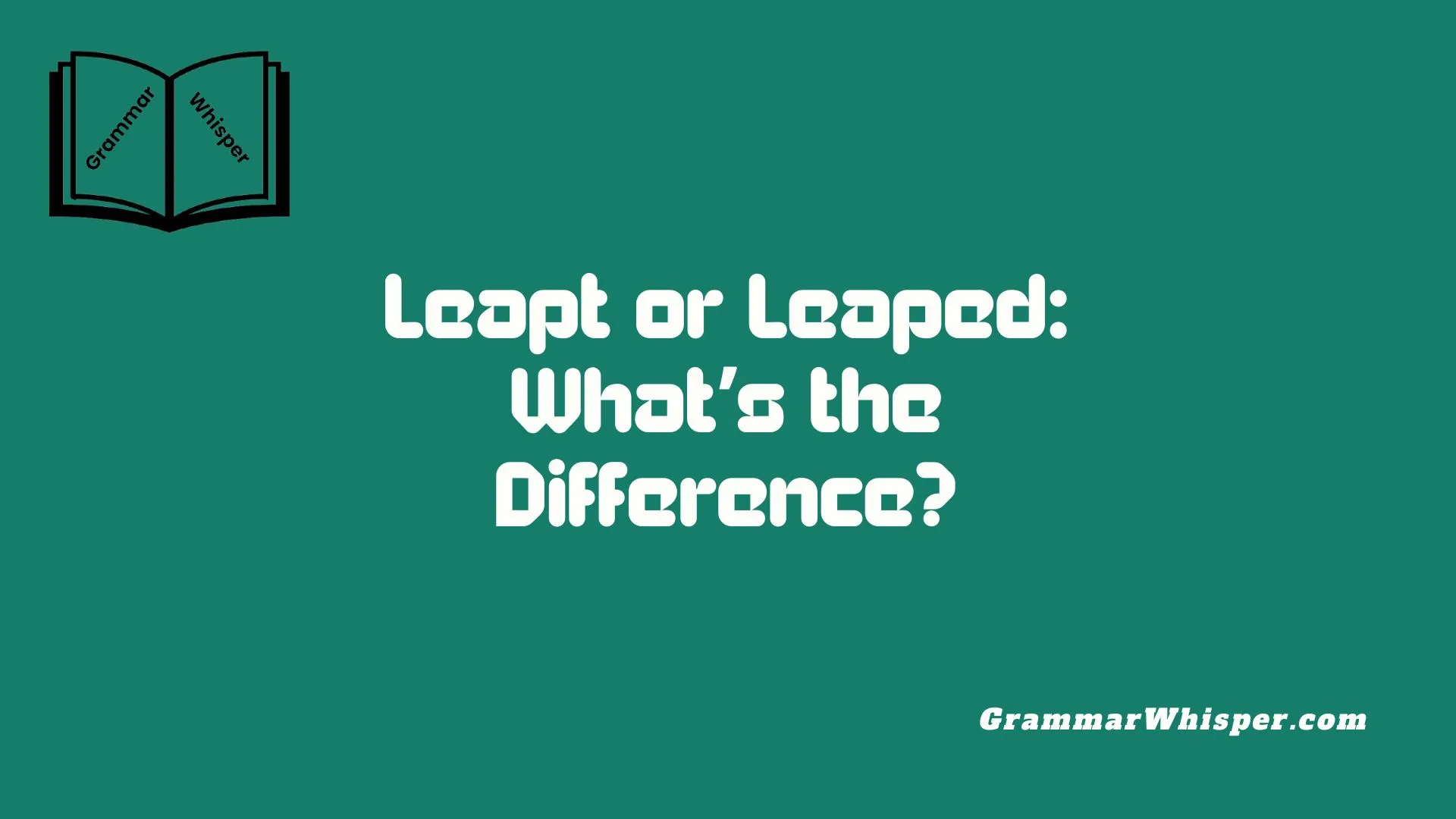In English, the verb leap often confuses both writers and speakers. When you describe a jump in the past, do you use leapt or leaped? In my grammar classes, I always point out that both forms are correct – but which one fits your tone depends on context. British usage usually prefers leapt, while American English leans toward leaped. When I review student writing, I recommend choosing based on audience and consistency. A reliable guide is asking yourself: what sounds natural in your sentence?
For one project, I built a comprehensive style guide to help a client align with their brand voice. We studied grammar, analyzed data, and explored usage history. The insights we found helped shape how the team communicated clearly and naturally. Our practical rule? Choose one form and stick to it. Even though historical breaks exist in preference, both are acceptable. When in doubt, trust reference tips to make those subtle – but important – language choices with confidence.
Quick Look: Leapt vs. Leaped – What’s the Difference?
| Feature | Leapt | Leaped |
| Verb Form | Past tense and past participle (irregular) | Past tense and past participle (regular) |
| Region | Preferred in British English | Preferred in American English |
| Tone | Slightly formal or poetic | More conversational and modern |
| Frequency (Global) | Less common than “leaped” globally | More widely used worldwide |
| Usage in Writing | Common in literature and the British media | Common in everyday writing, journalism, and American media |
What Is the Past Tense of “Leap”?
The verb leap means to jump or spring a long distance, usually with great force or speed. Like many verbs, it has different forms for past actions.
- Base form: leap
- Past tense: leapt/leaped
- Past participle: leapt/leaped
Here, both leapt and leaped act as valid past tense and past participle forms, depending on the speaker’s or writer’s preference and regional influence.
Grammar-wise, “leapt” represents the irregular verb form (similar to “crept” or “slept”), while “leaped” follows the regular pattern of adding “-ed.” This duality is somewhat rare but not unique in English.
Historical Roots and Etymology
The verb leap traces back to Old English hlēapan, which meant “to jump or spring.” Historically, English verbs often had irregular past-tense forms inherited from Old English or Norse roots.
Over centuries, many irregular verbs either stayed the same or evolved into regular patterns. The past tense leapt emerged early and became standard in British English, while leaped grew popular later, especially across the Atlantic.
The history shows a linguistic tug-of-war between preserving tradition and adopting simpler, more regular forms. Both survived because English is flexible and diverse in usage.
Usage Trends: What Do People Say and Write?
Modern data reveals interesting trends:
- American English speakers overwhelmingly favor leaped. It’s easier, more consistent with other regular verbs, and feels natural in conversation and writing.
- British English speakers prefer leapt, especially in formal writing, literature, and poetic contexts.
Using Google Ngrams, we can see the steady rise of “leaped” in the US from the 19th century onward, while “leapt” remains strong but slightly less common.
In fiction and journalism, American authors tend to write “leaped”, while British authors use “leapt” more often, reinforcing regional stylistic preferences.
Regional Differences: US vs UK
| Region | Preference | Common Contexts | Example Sentences |
| United States | Leaped | Every day writing, media, spoken language | “She leaped over the fence with ease.” |
| United Kingdom | Leapt | Formal writing, literature,and poetry | “He leapt onto the stage without hesitation.” |
These differences matter when you write for a specific audience. For American readers, “leaped” feels natural and expected. British readers often expect “leapt”, which sounds more traditional.
Tone, Style, and Rhythm: How Writers Choose
Writers often pick between leapt and leaped to set the mood or rhythm of a sentence.
- Leapt adds a certain poetic or dramatic flair. It can lend elegance or gravity, making it popular in novels and poetry.
- Leaped sounds straightforward and modern. It fits casual conversation, journalism, and clear prose.
For example:
- “The cat leapt gracefully onto the windowsill.” (Poetic, elegant)
- “The cat leaped onto the table to grab the food.” (Plain, direct)
Choosing the right form helps maintain tone and flow.
Context Matters: When to Use “Leapt” or “Leaped”
Understanding context sharpens your choice. Consider these factors:
- Formal vs. informal: Use leapt in formal or literary settings; use leaped in casual or conversational writing.
- Dialogue: Characters’ speech often favors leaping for naturalness unless the setting is very formal or old-fashioned.
- Narrative: Writers often choose leaped for rhythm and style, but use leaped for clarity and pace.
Examples in Context
Sentence Type
Example with “Leapt”
Example with “Leaped”
Formal narrative
“She leapt into the air, reaching for the stars.”
“She leaped into the air, grabbing the rope.”
Casual dialogue
“He just leapt right over the puddle.”
“He just leaped right over the puddle.”
Consistency in Your Writing: Why It Matters
Regardless of which past tense form you choose, consistency is key. Mixing “leapt” and “leaped” in the same piece can confuse readers and undermine professionalism.
Tips to stay consistent:
- Pick a style guide and stick with it. For American English, choose leaped; for British English, pick leapt.
- Use find-and-replace tools in writing software to maintain uniformity.
- Consider your audience and the publication’s expectations.
Writer’s Toolkit: Alternatives to “Leapt” and “Leaped”
Sometimes, “leapt” or “leaped” isn’t quite right. Luckily, English offers plenty of vivid synonyms to spice up your writing.
Synonym
Nuance/Use Case
Example Sentence
Jumped
Most general, everyday usage
“She jumped over the log.”
Bounded
Energetic, joyful motion
“The dog bounded across the field.”
Vaulted
Implies aid or height (e.g., with hands)
“He vaulted over the fence effortlessly.”
Sprang
Sudden or quick movement
“The cat sprang at the mouse.”
Hopped
Light, small jumps
“The frog hopped across the pond.”
Using these alternatives can prevent repetitive phrasing and sharpen your descriptions.
Common Mistakes and Misconceptions
Beware of these pitfalls:
- Switching forms in one text: Inconsistent use confuses readers.
- Assuming one is “wrong”: Both forms are correct; context decides.
- Overcorrecting: Trying to sound formal by forcing “leapt” in informal writing can feel awkward.
- Ignoring audience: Using British English forms for a US audience can reduce clarity.
Final Thoughts
- Both leapt and leaped are grammatically correct past tense and past participle forms of “leap.”
- Leaped dominates in American English; leapt in British English.
- Choose based on tone, style, and audience.
- Consistency within your writing is more important than which form you choose.
- Alternatives like “jumped,” “bounded,” or “vaulted” enrich your writing and reduce repetition.
Resources for Further Study
- Authoritative definitions and etymology
- Cambridge Dictionary – Usage examples and pronunciation
- American English preferences
- Google Ngram Viewer – Explore word usage trends over time
- Chicago Manual of Style – Style guidelines for US English
- Oxford Style Manual – British English style and usage
Summary Table: When to Use “Leapt” or “Leaped”
| Factor | Use “Leapt” | Use “Leaped” |
| Region | UK and Commonwealth countries | USA and Canada |
| Style | Formal, literary, poetic | Informal, modern, conversational |
| Audience | Readers expecting traditional usage | Readers preferring clear, modern usage |
| Writing type | Novels, poetry, and classical writing | Journalism, blogs, and casual writing |
English is a living language – “leapt” and “leaped” live side by side, each with its place. Now, you know which one to choose and why. Whether you want your writing to sound classic or contemporary, this guide helps you leap confidently over the confusion.
“Words are like leaves; where they most abound, much fruit of sense beneath is rarely found.” – Alexander Pope.
FAQs
What is the difference between “leapt” and “leaped”?
Both are correct past tense forms of the verb “leap.” Leapt is the irregular form favored in British English, while leaped is the regular form preferred in American English. The choice depends on region, style, and tone.
Is “leapt” considered old-fashioned?
Not necessarily. While “leapt” has a more traditional or poetic tone, it is still widely used in British English and formal writing. It is not outdatedd but less common in everyday American English.
Can I use “leaped” in British English writing?
Yes, “leaped” is understood and acceptable, but it sounds more informal and modern. British English generally prefers “leapt,” especially in literary or formal contexts.
Which form should I use in professional writing?
Choose based on your audience. For American readers, leaped is usually best for clarity and consistency. For British or Commonwealth audiences, leapt is often preferred, especially in formal or literary work. The key is to remain consistent.
Are there synonyms I can use instead of “leapt” or “leaped”?
Absolutely! Words like jumped, bounded, vaulted, sprang, and hopped offer alternatives depending on the context and tone you want to convey. Using synonyms can make your writing more vivid and less repetitive.











